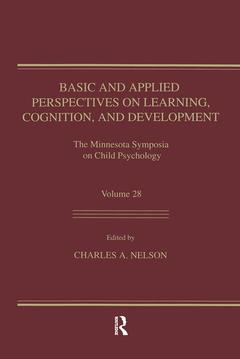Basic and Applied Perspectives on Learning, Cognition, and Development The Minnesota Symposia on Child Psychology, Volume 28 Minnesota Symposia on Child Psychology Series
Coordonnateur : Nelson Charles A.

Although current views of cognitive development owe a great deal to Jean Piaget, this field has undergone profound change in the years since Piaget's death. This can be witnessed both in the influence connectionist and dynamical system models have exerted on theories of cognition and language, and in how basic work in cognitive development has begun to influence those who work in applied (e.g., educational) settings. This volume brings together an eclectic group of distinguished experts who collectively represent the full spectrum of basic to applied aspects of cognitive development.
This book begins with chapters on cognition and language that represent the current Zeitgeist in cognitive science approaches to cognitive development broadly defined. Following a brief commentary on this work, the next section turns to more applied issues. Although the focus here is on arithmetic learning, the research programs described have profound implications for virtually all aspects of education and learning. The last chapter views cognitive development from the perspective of ethology and evolutionary biology, and in so doing provides a theoretical perspective that is novel and in some ways, prescient: specifically, how can our views of cognition incorporate recent work in biology?
Contents: Preface. L.B. Smith, Self-Organizing Processes in Learning to Learn Words: Development Is Not Induction. B. MacWhinney, F. Chang, Connectionism and Language Learning. K. Freeman, G. Deák, Systems Learning Symbol Systems: Commentary on MacWhinney and Smith. L.B. Resnick, Inventing Arithmetic: Making Children's Intuition Work in School. J.W. Stigler, C. Fernandez, Learning Mathematics From Classroom Instruction: Cross-Cultural and Experimental Perspectives. H.W. Stevenson, Mathematics Achievement of American Students: First in the World by the Year 2000? K.E. Kremer, E.K. Adam, S.R. Jimerson, Research and Reform for U.S. Mathematics Education: What Counts? A Commentary on Stevenson, Stigler and Fernandez, and Resnick. W.R. Charlesworth, An Evolutionary Approach to Cognition and Learning. J.E. Turnure, The Evolution of Mind and Culture: A Commentary on Charlesworth.
Date de parution : 02-2019
15.6x23.4 cm
Thème de Basic and Applied Perspectives on Learning, Cognition... :
Mots-clés :
american; teachers; mathematics; achievement; students; shape; bias; east; asian; math; American College Test; Self-organizing Feature Map; OVS Word Order; Sasak; Cl Research; East Asian Students; Competition Model; American Fourth Graders; National Education Goals Panel; OVS; Shape Bias; East Asian Children; Differential Points; Inflectional Morphology; Cl Method; Word Learning; East Asian Teachers; Vice Versa; Gene Culture Coevolution; Eleventh Graders; Connectionist Models; Mathematical Achievement; Japanese Students; Math Math; Street Math



